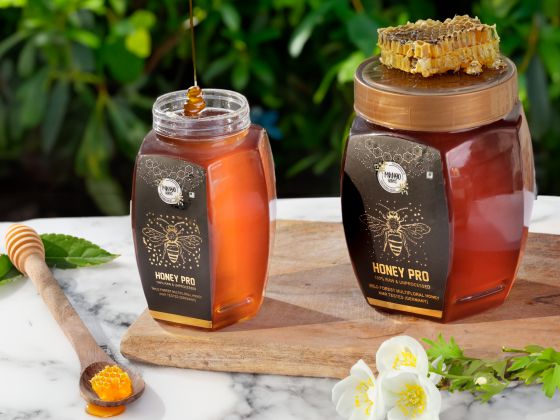Wild Forest Multifloral Honey is one of the finest honeys offered by Caffitea. This honey is collected from the Giant Wild Bees (Apis Dorsata), found in deep forests.
Wild Forest Multifloral honey is 100% raw, unprocessed, unpasteurized, organic honey, collected by the tribal beekeepers dwelling in the forests. These beekeepers are engaged in beekeeping and collecting natural honey from deep forests, since centuries.
The natural environment of the forests ensures that you get the purest and finest honey in the Jar. Wild Forest Honey is absolutely free of any antibiotics, hormones, or any form of external chemical. Purest honey doesn’t need any form of external agent for preservation.
The honey collected by the tribal beekeepers is given to you in the most authentic form without any added sugar, artificial or natural sweetener, free from preservatives, additives, colors or any kind of foreign substance, other than natural raw honey.
The taste of Caffites Black Wild Forest Honey is a testament to its purity. Pure honey will never have the exact same taste, like the commercial honeys being sold in the market. The taste will vary according to batches due to the botanical diversity of the region, and the different flowers used by the bees to make honey, during different seasons, around the year.
APIS DORSATA – THE GIANT HONEY BEE
Apis Dorsata or the Giant honey bee, is described as one of the most dangerous species found mainly in Southern Asian region, due to their threatening defensive behavior. Unlike other bees, they have a different nest design and build their nests at greater heights under tree branches or under cliffs, rather than in cavities. Because of which it’s very difficult to collect honey from these bees.
The large body size of Apis dorsata allows increased flight distance and foraging range compared to other honey bee species. Apis dorsata colonies can perform seasonal long-distance migrations in order to exploit the nectar and pollen resources available at different times throughout many parts of southern Asia.
Apis dorsata is considered to be extremely important to both honey gatherers/hunters and agricultural producers in southern Asia. There is much to gain for locals willing to risk harvesting honey from these colonies because Apis dorsata colonies are so large and such efficient honey producers. Some of the larger colonies can contain up to 15 kg (33 lbs.) of honey.
Apis dorsata is not managed like other honey bee species because they are an open-nesting species. Attempts to place Apis dorsata colonies in wooden hives traditionally like other bee species, haven’t been very successful, as these bees have not evolved to live in dark cavities.
For centuries, people throughout southern Asia have gone through great risk to harvest honey from Apis dorsata colonies, as they are usually in the tallest trees/cliffs, thus presenting a major challenge to access. Traditional honey gathering is usually done on specific times only, to minimize the number of flying bees once the colony is disturbed.



























